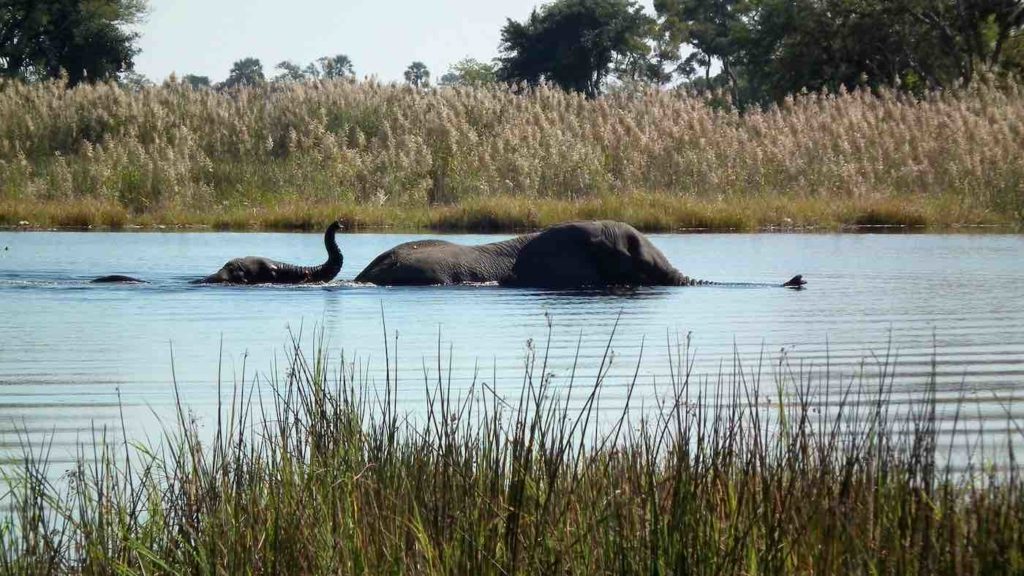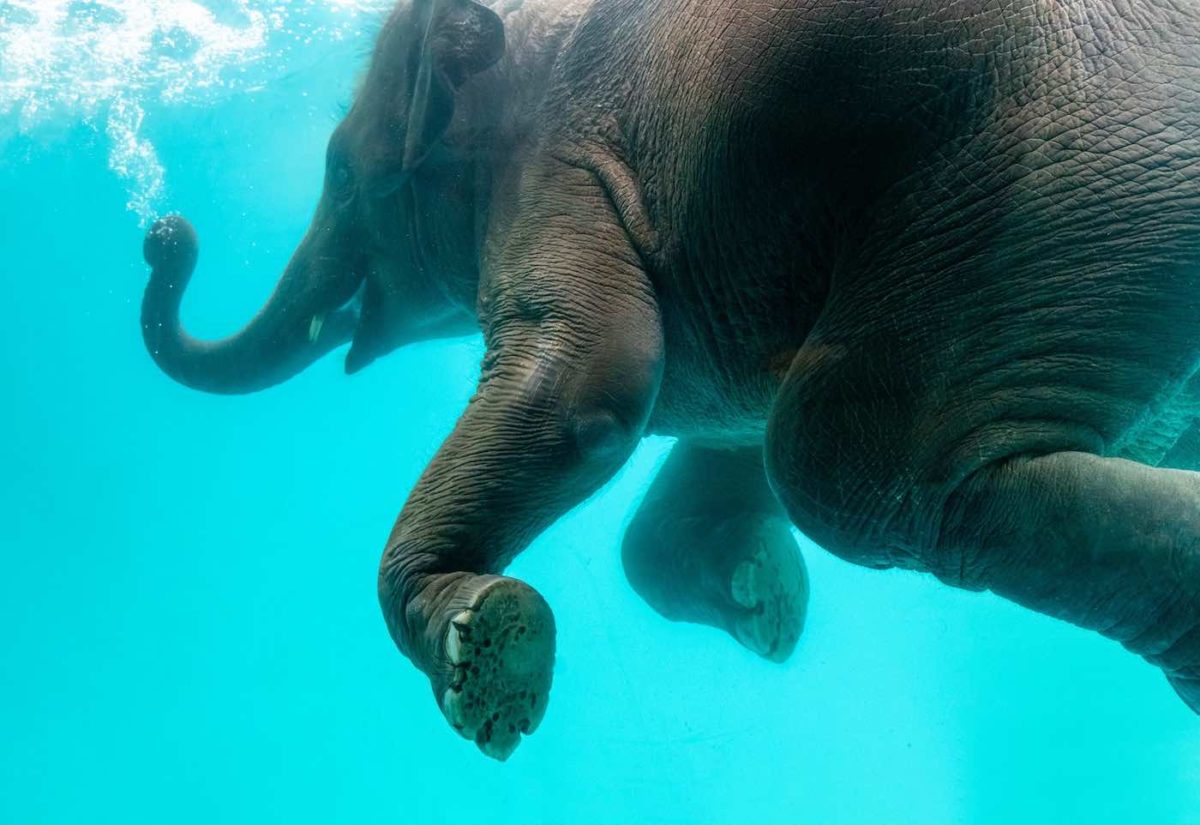Elephants are known to be big and bulky animals. Many people think that they cannot move or swim very well because of just that, their size. However, elephants are excellent swimmers and capable of crossing rivers and even swimming underwater!
The largest ever recorded elephant swim was over 22 miles long and took place in India. The elephant trunk serves as a snorkel while they’re swimming, this helps them to breathe while they are underwater.
While most elephants live on land, there are some that live in swampy areas. These elephants have webbed feet that help them to swim through the water.
Elephants are amazing creatures and it is fascinating to learn about all of the things they can do! It is clear that they are not limited by their size, but rather, they are able to use their abilities to adapt to their environment and survive.
Read on for more amazing facts about why elephants can swim.
Elephants are born swimmers
Elephants are pretty much born swimmers! However, they need to learn how to use their trunk as a snorkel in order to breathe while swimming. A South African elephant conservation researcher center found that baby elephants (calves) did not learn how to swim until they were a couple of months old.
The elephant’s mother will stay with them when they are near water until they are ready. It’s the motherly instinct of mammals, very similar to the human behavior.
It is interesting to note that elephants are the only mammal that can float without any floating devices. This is due to their natural buoyancy.
What do Elephants use to help them swim?
Elephants use their trunk as a snorkel while swimming. This helps them to breathe while they are underwater.
Additionally, their large ears help to keep water out and their tails act as a rudder.

How do Elephants swim?
Elephants typically swim using somewhat of a breaststroke. For us humans, this will be comparable to a “doggy swim” type of stroke rather than a clean human breaststroke.
The elephants four legs are used to propel them through the water. Their legs are so powerful that they can swim continuously for as long as six hours!
An elephant’s head and torso are generally kept just below the surface of the water as it paddles its massive limbs back and forth on a typical swim.
As mentioned, however, keep its strong trunk raised above the water and use it as a sort of snorkel to allow it to breathe even while the rest of its body remains in the water.
They will often times swim in groups with the larger elephants leading the way.
Swimming is clearly a natural ability for elephants and they are great swimmers under normal circumstances!
How far can an Elephant swim for?
As mentioned in the introduction of this article, the largest recorded elephant swim was over 22 miles (~35 kilometers) long and took place in India.
There is however fossil evidence that elephants have traveled in water for over 31 miles (~50 kilometers). With both of these examples at hand, it’s hard to say anything else other than that elephants are able to swim long distances.
Elephants typically swim for short distances though, but they are capable of swimming for long periods of time or longer distances if necessary.
Why do Elephants swim?
Elephants swim for a variety of reasons. They may need to cross a river in order to get to a new area. Additionally, they may swim in order to cool off or during mating season.
Amongst scientists, Elephants are believed to be swimming from one island to another in order to find a mate or to simply explore their habitat.
Do Elephants like swimming?
It seems most elephants enjoy swimming and they, especially baby elephants often play in water when given the opportunity.
It’s also quite common to see elephants swim in groups as form of a social activity and to stay cool from the hot sun.
Can Elephants swim underwater?
Yes, elephants can swim underwater for short distances. They are able to hold their breath for up to two minutes while diving fully underwater.
What is the deepest an elephant has been recorded to swim?
The deepest an elephant has been recorded to swim is approximately 20 feet (6 meters). That’s deep water! This was recorded in India.
One of the most famous Elephants that is especially known for swimming is Rajan, the beloved swimming elephant of the Andaman Islands who had his own documentary aired in the beginning of the century.
Can Baby Elephants swim?
Yes, baby elephants can swim. They often times learn how to swim by following their mothers into the water. Additionally, they will play in the water as they get a bit older and show off their swimming skills to their peers.
It is interesting to note that a baby elephant typically stay close to their mother when they are near water until they are between 7-15 months old. After they have learned how to swim and are more comfortable in the water, they will venture off on their own.
Can an Elephant drown?
Yes, an elephant can drown. While they are great swimmers, there have been instances where an elephant has gotten caught in a rip current or other dangerous situation and drowned.
It is important to remember that elephants are animals and, like all animals, they have limitations. It is always best to err on the side of caution when it comes to swimming with elephants.
Are Elephants under any immediate threat when they swim?
What is the biggest threat to Elephants when they swim?
The biggest threat to elephants when they swim is humans. Unfortunately, there are many instances where humans have hunted and killed elephants for their ivory tusks. Rip tides and currents are also huge dangers to elephants that decide to go for a swim in more adventurous waters.
In addition to being hunted, elephants are also at risk of being caught in fishing nets and other fishing gear. This can lead to them drowning or being injured.
Could a crocodile kill an Elephant?
It is possible for a crocodile to kill an elephant, but almost impossible for a healthy elephant to get killed by a crocodile. Crocodiles are apex predators and they are capable of taking down large animals.
In regions where elephants live, most notably in portions of both Africa and India that also happen to be home to two of the world’s biggest crocodile species: the Nile Crocodile and the enormous Saltwater Crocodile.
While they can severely hurt an elephant, it’s extremely unlikely that a crocodile would be able to take down a healthy adult elephant. The size difference between the two animals is just too great.
Recommended reading: Everything you need to know about Elephants and Water
FAQ about African Elephants and Asian Elephants Swimming
Both African and Asian elephants are good swimmers and they float in water.
The deepest an elephant has been recorded to swim is approximately 20 feet (6 meters).
Yes, baby elephants typically learn how to swim by following their mothers into the water.
Elephants have been known to swim up to 6 miles in a day.
Some elephants have been known to enjoy swimming underwater, using their trunk as a snorkel, while others seem to prefer staying afloat.
Yes, an elephant can drown if they get caught in a rip current or other dangerous situation.
The cost of swimming with elephants in Thailand varies depending on the specific tour or company you book with. However, prices typically range from $50-$200 per person.
Conclusion
Elephants are interesting creatures and their abilities to swim have surprised many. It is clear that they are not limited by their size and can use their abilities to adapt to their environment.
Swimming provides elephants with an opportunity to explore, socialize, and cool off in hot weather. While baby elephants often follow their mothers into the water, they eventually learn to swim on their own.
The biggest threat to elephants when they swim is currents that could move them from shallow waters to open sea in no time. Crocodiles could potentially kill an elephant, but it is very unlikely.
In conclusion, elephants are great swimmers and their abilities should not be underestimated.

5 replies on “Can Elephants swim? They even swim underwater!”
[…] Read More […]
[…] Read More […]
[…] Source: “Can Elephants swim? They even swim underwater!” — Elephant Guide […]
[…] Source: “Can Elephants swim? They even swim underwater!” — Elephant Guide […]
[…] buoyancy: Their large and muscular body provides them with natural buoyancy, keeping them afloat and allowing them to swim […]